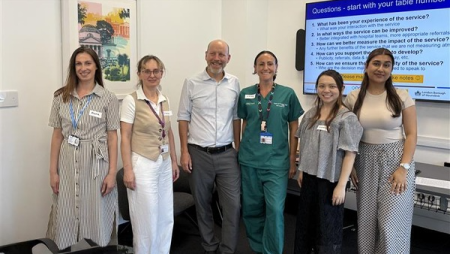A ground‑breaking pilot that embeds a dedicated Targeted Support Officer on the wards of West Middlesex University Hospital (WMUH) has already freed up beds worth more than £227,000 in just three months and helped over a hundred patients return home safely with the right community support.
The results were unveiled at the ‘Linking Hospital to VCS Hospital Discharge Pilot Workshop’ in July, where NHS staff, Hounslow Council, and voluntary‑sector partners reflected on the programme’s first seven months and planned its next phase.

Bridging the gap between the hospital and the community
The pilot tackles three stubborn problems:
- Non‑medical delays to discharge
- Health inequity
- Lack of awareness of voluntary & community services by hospital staff.
A single officer works hand‑in‑hand with hospital teams, Hounslow Council housing services, and local VCSE organisations to provide in‑person discharge support followed by longer-term, preventative help in the community by a dedicated Floating Support Worker. Typical help ranges from support for benefits and claims and improving home environment to onward referrals to debt advice and mental‑health counselling, tailored to the individual’s needs.
Measurable impact in seven months:
- 122 patient records between 14 November 2024 and 11 June 2025, representing 102 unique patients being supported by the pilot.
- 54 patients avoided 11 full bed‑days each on average, comparing the 3-months before and after they received Targeted Discharge Support, delivering a £227,502 cost‑avoidance in the first three months alone — almost double the service’s projected annual cost of £118,145.
- 34 patients referred to the Hounslow Reach floating‑support team for continued assistance
- Patients report improved mood, reduced anxiety and clearer sign‑posting: “Silvia [Targeted Support Officer] was brilliant… everything we needed was done,” said one beneficiary.
Real‑life stories
- An 80‑year‑old man now has a pendant alarm, key‑safe and railings installed, letting him live safely at home after a fall
- A woman in her 70s who became homeless after an overdose secured emergency housing and fast‑tracked visa support within three weeks
Funding secured to December 2025
In May the charity CW+ awarded additional grant funding, allowing the pilot to run until the end of the year and to explore options for sustainable funding.
Dr Emma Rowlandson, Consultant in Acute Medicine at WMUH, said:
“Every unnecessary day in hospital carries risks. By linking directly with expert community groups, we’re getting people home faster, healthier, and with the support they truly need.”
Mark Blomfield, Senior Joint Commissioning Manager at Hounslow Council, added:
“This partnership shows that a single, person-centred post can unlock big system savings while tackling health inequalities head‑on. The next step is to make this way of working business as usual across the borough.”
Next steps
- Strengthen referral pathways within hospital teams and the London Ambulance Service.
- Refine data collection to capture wider social outcomes and equity impacts.
- Engage regional decision‑makers to secure long-term funding and replicate the model in other Trusts.